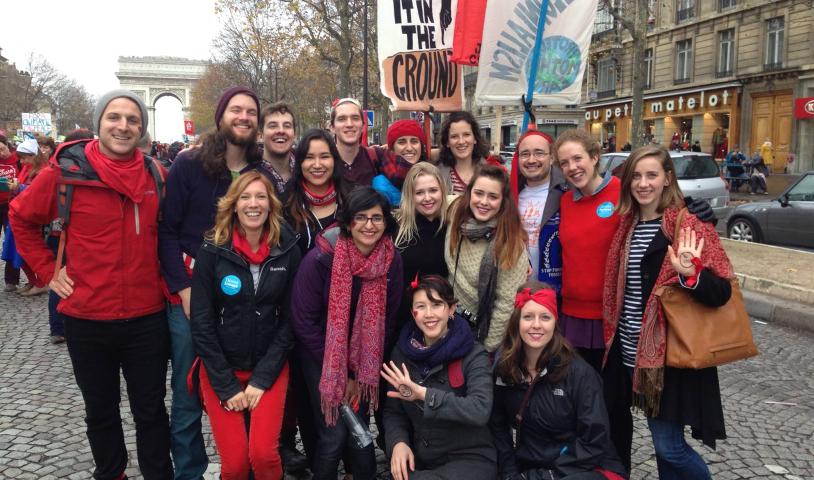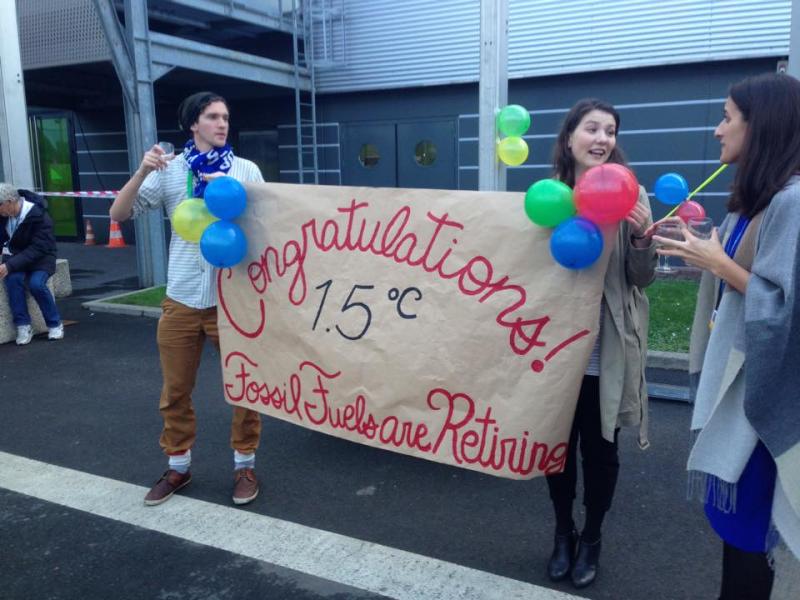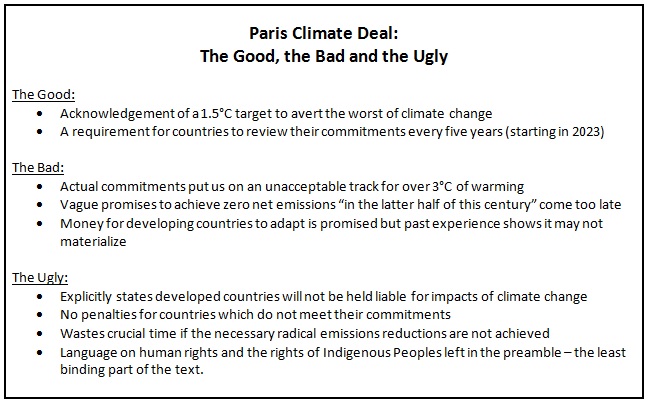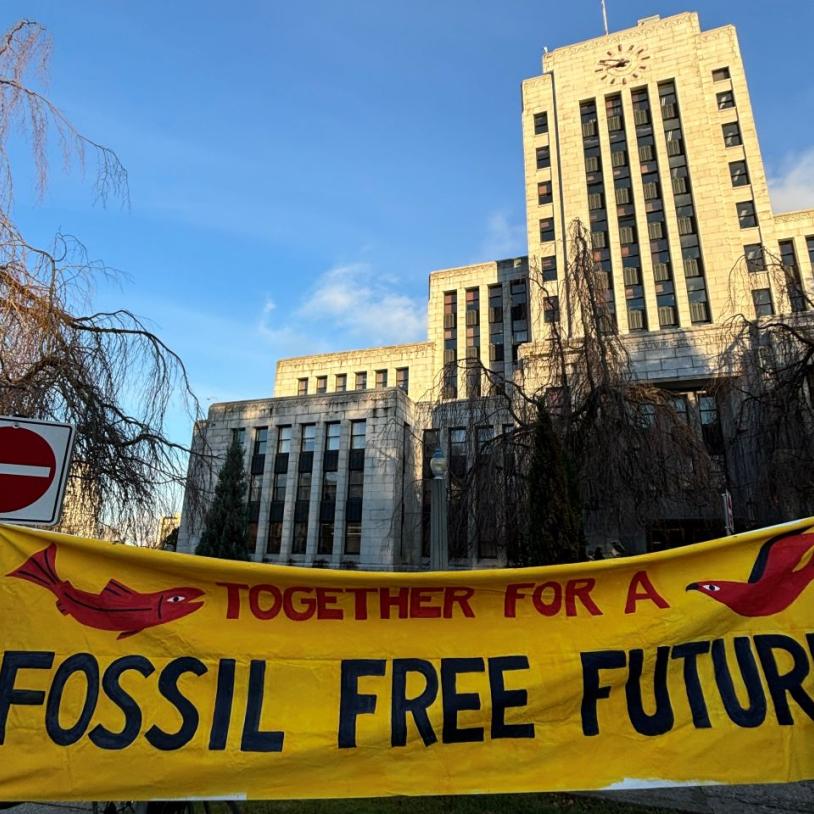The World Needs Swift Action, and the Paris Agreement Doesn't Go Far Enough
Tuesday, December 15, 2015
An update on COP21 climate negotiations from WC Campaigner Torrance Coste
December 16, 2015
Some of us have been waiting for the Paris climate summit for years. Others, for their whole lives.
The 21st Conference of the Parties to the United Nations Framework Convention on Climate Change (or COP21) was supposed to bring leaders from around the world together to forge a concrete plan to reduce carbon emissions in an effort to avoid the worst of the climate change catastrophe.
In terms of that goal, COP21 didn't deliver.
Instead, the conference produced a weak agreement that acknowledges that emissions need to decline and sets vague goals on the limit of acceptable global warming. This isn't enough.
The Paris Agreement includes financial support for the most vulnerable nations in the world, but not at the level that was hoped for. And it likely won't be enough to lessen the impact of future climate catastrophes in some of the poorest communities in the world.
The deal includes a commitment for all nations to end fossil fuel use and to transition our economies to 100% renewable energy, but the timeline is vague: "by the second half of the century". That is flat-out too late.
 At COP21, "Zero By 2050" (transition to zero emissions) emerged as rallying cry for vulnerable nations and civil society alike. It’s seen as the latest date to which we can afford to continue to use dirty energy.
At COP21, "Zero By 2050" (transition to zero emissions) emerged as rallying cry for vulnerable nations and civil society alike. It’s seen as the latest date to which we can afford to continue to use dirty energy.
The agreement includes a commitment by all countries to limit climate change to well below 2° Celsius above pre-industrial temperatures, with an aim of 1.5°C. This has never happened before, and that's exciting. The problem is, the current targets by every nation in the world have us on pace for over 3°C of warming. This separation between commitments and actual targets – referred to as the Ambition Gap – needs to close fast (and fast isn't a speed that official UN processes are known for).
Yeb Sano, a former Philippines COP negotiator and current champion for climate justice, summed up the Paris Agreement with his customary simple eloquence: "It's not bad, but not bad is not what we were rooting for."
Where we go from here
The agreement has some elements the climate movement can use, but it's nowhere close to being the transformative, radical document needed to accelerate global climate action in a fair and transparent way at the rate and scope required. In all fairness, few expected COP21 to produce that document, so it's not totally accurate to call the Paris Agreement a let-down. But nor is it accurate to call it a win.
Now let's talk about what we can use, and how we can get to that win.
Limiting climate change to 1.5°C means huge changes to domestic policy around fossil fuel development. This goal has been announced, and it now falls to us to build the people power to force governments around the world to make these changes. I overheard a stranger say this on the train home on the last day of COP, and I've heard the most influential environmental activists in the world say it in the media in the days since.
Our job is to show up, every day, and let our leaders know that failure to limit climate change to 1.5°C is not an option. The UN didn't force nations to include specifics to achieve this goal, so doing that becomes our job, too.
 In Canada, this means that tar sands oil must stay in the ground, and that new pipelines like Enbridge Northern Gateway, Kinder Morgan Trans Mountain and Energy East are obsolete and incompatible with the low-carbon economy that we have to start building today. At COP21, the Canadian Youth Delegation hosted a tongue-in-cheek retirement party for fossil fuels inside the conference centre. Complete with champagne and speeches, the action was powerful and hopeful – Dr. Jane Goodall even stopped by!
In Canada, this means that tar sands oil must stay in the ground, and that new pipelines like Enbridge Northern Gateway, Kinder Morgan Trans Mountain and Energy East are obsolete and incompatible with the low-carbon economy that we have to start building today. At COP21, the Canadian Youth Delegation hosted a tongue-in-cheek retirement party for fossil fuels inside the conference centre. Complete with champagne and speeches, the action was powerful and hopeful – Dr. Jane Goodall even stopped by!
The 1.5°C target means that building a brand new fossil fuel export industry anywhere is a terrible idea, and in BC that means leaving the LNG pipe dream behind for good.
This has big implications for our work at the Wilderness Committee. We've been a leading advocate against the exploitation of fracked gas for years, and the 1.5°C goal will only give us further motivation.
At COP21, the BC government delegation was the only one I heard of that was promoting itself as a “climate leader” while simultaneously placing fossil fuel exports as an economic priority back at home.
We'll continue to work with First Nations and local communities across BC to pressure the Provincial government to leave dirty LNG underground, where it belongs.
We've argued for decades that BC can and should lead the world in developing safe, truly sustainable economies that respect ecosystems and our place within them. I stressed this to BC’s Premier and Environment Minister during COP21.
You can bet we'll continue this work in the future.

On Saturday, as the Paris Agreement was being finalized, I joined 15,000 people in the streets of Paris to call for climate justice. It was the first sanctioned mass public gathering since the tragic attacks last month, and it was an incredibly powerful experience.
On the iconic Champs-Élysées in the shadow of the Arc de Triomphe, I felt the energy and power of the people who are going to return to their communities and fight for the changes we need.
At the Wilderness Committee we work with these people – with you – every day.
My experience at COP21 was at times frustrating, disheartening and emotional. But it also exposed me to people working to build a better world. I was honoured to be a part of the Canadian Youth Delegation, a dedicated and super-talented group of young activists from across the country. I've learned a lot from them and from others in Paris, and I can't wait to get back and apply these lessons in the work I do here with you.
I'm tired, but I'm glad to be on my way home.
From Paris,
Torrance Coste | Vancouver Island Campaigner






